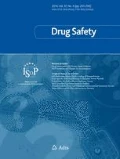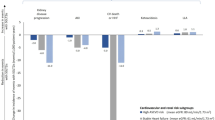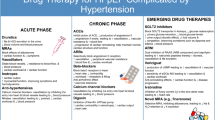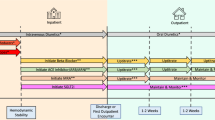Abstract
The ever-increasing introduction of new therapeutic agents means that the potential for drug interactions is likely to escalate. Numerous different classes of drugs are currently used to treat hypertension. The angiotensin receptor blockers offer one of the newest approaches to the management of patients with high blood pressure. Compared with other classes of antihypertensive agents, the angiotensin receptor blockers appear overall to have a low potential for drug interactions, but variations within the class have been detected. Losartan and irbesartan have a greater affinity for cytochrome P450 (CYP) isoenzymes and, thus, are more likely to be implicated in drug interactions. There is pharmacokinetic evidence to suggest that such interactions could have a clinical impact. Candesartan cilexetil, valsartan and eprosartan have variable but generally modest affinity and telmisartan has no affinity for any of the CYP isoenzymes. In vitro studies and pharmacokinetic/pharmacodynamic evaluation can provide evidence for some interactions, but only a relatively small number of drug combinations are usually studied in this way. The absence of any pharmacokinetic evidence of drug interaction, however, should not lead to complacency. Patients should be made aware of possible interactions, especially involving the concurrent use of over-the-counter products, and it may be prudent for all patients receiving antihypertensive treatment to be monitored for possible drug interactions at their regular check-ups. The physician can help by prescribing agents with a low potential for interaction, such as angiotensin receptor blockers.



Similar content being viewed by others
References
Materson BJ, Reda DJ, Cushman WC, et al. Single-drug therapy for hypertension in men: a comparison of six antihypertensive agents with placebo. N Engl J Med 1993; 328: 914–21
Materson BJ, Reda DJ, Cushman WC, et al. Department of Veterans Affairs single-drug therapy of hypertension study: revised figures and new data. Am J Hypertens 1995; 8: 189–92
Chobanian AV, Bakris GL, Black HR, et al. The Seventh Report of the Joint National Committee on Prevention Detection, Evaluation, and Treatment of High Blood Pressure. JAMA 2003; 289: 2560–71
Nichol MB, Margolies JE, Gill MA. Factors associated with antihypertensive prescribing. Ann Pharmacother 1997; 31: 154–9
Seymour RM, Routledge PA. Important drug-drug interactions in the elderly. Drugs Aging 1998; 12: 485–94
Kurfees JF, Dotson RL. Drug interactions in the elderly. J Fam Pract 1987; 25: 477–88
Stewart RB, Cooper JW. Polypharmacy in the aged: practical solutions. Drugs Aging 1994; 4: 449–61
Barnett NL, Denham MJ, Francis SA. Over-the-counter medicines and the elderly. J R Coll Physicians Lond 2000; 34: 445–6
Barat I, Andreasen F, Damsgaard EM. The consumption of drugs by 75-year-old individuals living in their own homes. Eur J Clin Pharmacol 2000; 56: 501–9
Durnas C, Loi CM, Cusack BJ. Hepatic drug metabolism and aging. Clin Pharmacokinet 1990; 19: 359–89
Jaski ME, Schwartzberg JG, Guttman RA, et al. Medication review and documentation in physician office practice. Eff Clin Pract 2000; 3: 31–4
Shintani S, Murase H, Tsukagoshi H, et al. Glycyrrhizin (licorice)-induced hypokalemic myopathy: report of two cases and review of the literature. Eur Neurol 1992; 32: 44–51
Brinker F. Herb contraindications and drug interactions. Sandy (OR): Eclectic Institute, 1997
Neutel JM. Ambulatory blood pressure monitoring to assess the comparative efficacy and duration of action of a novel new angiotensin II receptor blocker: telmisartan. Blood Press 2001; 10Suppl. 1: 27–32
Elliott WJ. Circadian variation in blood pressure: implications for the elderly patient. Am J Hypertens 1999; 12(2 Pt 2): 43S–9S
Guidelines Subcommittee. 1999 World Health Organization - International Society of Hypertension Guidelines for the Management of Hypertension. J Hypertens 1999; 17: 151–83
Diokno AC, Brown MB, Herzog AR. Relationship between use of diuretics and continence status in the elderly. Urology 1991; 38: 39–42
Burchardt M, Burchardt T, Baer L, et al. Hypertension is associated with severe erectile dysfunction. J Urol 2000; 164: 1188–91
Dougall HT, McLay J. A comparative review of the adverse effects of calcium antagonists. Drug Saf 1996; 15: 91–106
Saruta T, Arakawa K, Iimura O, et al. Difference in the incidence of cough induced by angiotensin converting enzyme inhibitors: a comparative study using imidapril hydrochloride and enalapril maleate. Hypertens Res 1999; 22: 197–202
Gennari FJ, Gennari AS. Recent advances in the management of hypertension in the elderly. Curr Hypertens Rep 2000; 2: 543–50
Willmore LJ. Choice and use of newer anticonvulsant drugs in older patients. Drugs Aging 2000; 17: 441–52
Krishnan KR. Depression as a contributing factor in cerebrovascular disease. Am Heart J 2000; 140(4 Suppl.): 70–6
Lindeman RD. Should the sale of analgesic mixtures and nonsteroidal anti-inflammatory agents (NSAIDs) continue to be allowed as over-the-counter (OTC) medications? Geriatr Nephrol Urol 1999; 9: 3–4
Hayreh SS, Zimmerman MB, Podhajsky P, et al. Nocturnal arterial hypotension and its role in optic nerve head and ocular ischemic disorders. Am J Ophthalmol 1994; 117: 603–24
Imai Y, Tsuji I, Nagai K, et al. Circadian blood pressure variation related to morbidity and mortality from cerebrovascular and cardiovascular diseases. Ann N Y Acad Sci 1996; 15: 172–85
Watanabe N, Imai Y, Nagai K, et al. Nocturnal blood pressure and silent cerebrovascular lesions in elderly Japanese. Stroke 1996; 27: 1319–27
Slaughter RL, Edwards DJ. Recent advances: the cytochrome P450 enzymes. Ann Pharmacother 1995; 29: 619–24
Taavitsainen P, Kiukaanniemi K, Pelkonen O. In vitro inhibition screening of human hepatic P450 enzymes by five angiotensin-II receptor antagonists. Eur J Clin Pharmacol 2000; 56: 135–40
Song JC, White CM. Pharmacologic, pharmacokinetic, and therapeutic differences among angiotensin II receptor antagonists. Pharmacotherapy 2000; 20: 130–9
Kaukonen KM, Olkkola KT, Neuvonen PJ. Fluconazole but not itraconazole decreases the metabolism of losartan to E-3174. Eur J Clin Pharmacol 1998; 53: 445–9
Kazierad DJ, Martin DE, Blum RA, et al. Effect of fluconazole on the pharmacokinetics of eprosartan and losartan in healthy male volunteers. Clin Pharmacol Ther 1997; 62: 417–25
Goldberg MR, Lo MW, Deutsch PJ, et al. Phenobarbital minimally alters plasma concentrations of losartan and its active metabolite E-3174. Clin Pharmacol Ther 1996; 59: 268–74
Scripture CD, Pieper JA. Clinical pharmacokinetics of fluvastatin. Clin Pharmacokinet 2001; 40: 263–81
Williamson KM, Patterson JH, McQueen RH, et al. Effects of erythromycin or rifampin on losartan pharmacokinetics in healthy volunteers. Clin Pharmacol Ther 1998; 63: 316–23
Chawla PS, Kochar MS. Effect of pain and nonsteroidal analgesics on blood pressure. Wis Med J 1999; 98: 22–9
Conlin PR, Moore TJ, Swartz SL, et al. Effect of indomethacin on blood pressure lowering by captopril and losartan in hypertensive patients. Hypertension 2000; 36: 461–5
Nawarskas JJ, Townsend RR, Cirigliano MD, et al. Effect of aspirin on blood pressure in hypertensive patients taking enalapril or losartan. Am J Hypertens 1999; 12: 784–9
Goldberg MR, Lo MW, Bradstreet TE, et al. Effects of cimetidine on pharmacokinetics and pharmacodynamics of losartan, an AT1-selective non-peptide angiotensin II receptor antagonist. Eur J Clin Pharmacol 1995; 49: 115–9
Kong AN, Tomasko L, Waldman SA, et al. Losartan does not affect the pharmacokinetics and pharmacodynamics of warfarin. J Clin Pharmacol 1995; 35: 1008–15
Schaefer KL, Porter JA. Angiotensin II receptor antagonists: the prototype losartan. Ann Pharmacother 1996; 30: 625–36
Lill J, Bauer LA, Horn JR, et al. Cyclosporine-drug interactions and the influence of patient age. Am J Health Syst Pharm 2000; 57: 1579–84
Zaidenstein R, Soback S, Gips M, et al. Effect of grapefruit juice on the pharmacokinetics of losartan and its active metabolite E3174 in healthy volunteers. Ther Drug Monit 2001; 23: 369–73
Johnston CI. Angiotensin receptor antagonists: focus on losartan. Lancet 1995; 346: 1403–7
Bonate PL, Reith K, Weir S. Drug interactions at the renal level: implications for drug development. Clin Pharmacokinet 1998; 34: 375–404
Yamamoto T, Moriwaki Y, Takahashi S, et al. Effect of losartan potassium, an angiotensin II receptor antagonist, on renal excretion of oxypurinol and purine bases. J Rheumatol 2000; 27: 2232–6
McCrea JB, Lo MW, Tomasko L, et al. Absence of a pharmacokinetic interaction between losartan and hydrochlorothiazide. J Clin Pharmacol 1995; 35: 1200–6
Ruilope LM, Simpson RL, Toh J, et al. Controlled trial of losartan given concomitantly with different doses of hydrochlorothiazide in hypertensive patients. Blood Press 1996; 5: 32–40
Waldmeier F, Flesch G, Müller P, et al. Pharmacokinetics, disposition and biotransformation of [14C]-radiolabelled valsartan in healthy male volunteers after a single oral dose. Xenobiotica 1997; 27: 59–71
Colussi DM, Parisot C, Rossolino ML, et al. Protein binding in plasma of valsartan, a new angiotensin II receptor antagonist. J Clin Pharmacol 1997; 37: 214–21
Leung M, Remick RA. Potential drug interaction between lithium and valsartan. J Clin Psychopharmacol 2000; 20: 392–3
Bindschedler M, Degen P, Flesch G, et al. Pharmacokinetic and pharmacodynamic interaction of single oral doses of valsartan and furosemide. Eur J Clin Pharmacol 1997; 52: 371–8
Diovan® tablets prescribing information. Novartis Pharmaceuticals Corporation, East Hanover (NJ), 2002
Schmidt EK, Antonin KH, Flesch G, et al. An interaction study with cimetidine and the new angiotensin II antagonist valsartan. Eur J Clin Pharmacol 1998; 53: 451–8
Sifton DW, editor. Physicians Desk reference. Montvale (NJ): Medical Economics Co Inc., 2000
Mallion JM, Baguet JP, Siche JP, et al. Compliance, electronic monitoring and antihypertensive drugs. J Hypertens 1998; 16Suppl. 1: S75–S9
McClellan KJ, Goa KL. Candesartan cilexetil: a review of its use in essential hypertension. Drugs 1998; 56: 847–69
Jonkman JHG, van Lier JJ, van Heiningen PNM, et al. Pharmacokinetic drug interaction studies with candesartan cilexetil. J Hum Hypertens 1997; 11Suppl. 2: S31–S5
Conlin PR, Spence JD, Williams B, et al. Angiotensin II antagonists for hypertension: are there differences in efficacy? Am J Hypertens 2000; 13: 418–26
See S, Stirling AL. Candesartan cilexetil: an angiotensin IIreceptor blocker. Am J Health Syst Pharm 2000; 57: 739–46
Bourrie M, Meunier V, Berger Y, et al. Role of cytochrome P-4502C9 in irbesartan oxidation by human liver microsomes. Drug Metab Dispos 1999; 27: 288–96
Mangold B, Gielsdorf W, Marino MR. Irbesartan does not affect the steady-state pharmacodynamics and pharmacokinetics of warfarin. Eur J Clin Pharmacol 1999; 55: 593–8
Marino MR, Vachharajani NN. Drug interactions with irbesartan. Clin Pharmacokinet 2001; 40: 605–14
Marino MR, Vachharajani NN, Hadjilambris OW. Irbesartan does not affect the pharmacokinetics of simvastatin in healthy subjects. J Clin Pharmacol 2000; 40: 875–9
Bottorff MB, Tenero DM. Pharmacokinetics of eprosartan in healthy subjects, patients with hypertension, and special populations. Pharmacotherapy 1999; 19(4 Pt 2): 73S–8S
Blum RA, Kazierad DJ, Tenero DM. A review of eprosartan pharmacokinetic and pharmacodynamic drug interaction studies. Pharmacotherapy 1999; 19(4 Pt 2): 79S–85S
Kazierad DJ, Martin DE, Ilson B, et al. Eprosartan does not affect the pharmacodynamics of warfarin. J Clin Pharmacol 1998; 38: 649–53
Wienen W, Entzeroth M, van Meel JCA, et al. A review on telmisartan: a novel, long-acting angiotensin II-receptor antagonist. Cardiovasc Drug Rev 2000; 18: 127–56
Stangier J, Su CAPF. Pharmacokinetics of repeated oral doses of amlodipine and amlodipine plus telmisartan in healthy volunteers. J Clin Pharmacol 2000; 40: 1338–46
Yong C-L, Dias VC, Stangier J. Multiple-dose pharmacokinetics of telmisartan and of hydrochlorothiazide following concurrent administration in healthy subjects. J Clin Pharmacol 2000; 40: 1323–30
Stangier J, Su CA, Fraunhofer A, et al. Pharmacokinetics of acetaminophen and ibuprofen when coadministered with telmisartan in healthy volunteers. J Clin Pharmacol 2000; 40: 1338–46
Stangier J, Su CAPF, Stähle H, et al. Pharmacokinetic evidence of lack of interaction between telmisartan and simvastatin [abstract PC23]. J Renin Angiotensin Aldosterone Syst 2001; 2: 63
Stangier J, Hendriks MGC, van Lier JJ, et al. Steady-state pharmacodynamics and pharmacokinetics of warfarin in the presence and absence of telmisartan in healthy volunteers. J Clin Pharmacol 2000; 40: 1331–7
Heuer HJ, Dilger C, Michael, et al. Influence of repeated oral doses of telmisartan on the clinical pharmacology of glibenclamide in healthy subjects [abstract no. 38]. Eur J Clin Pharmacol 1998; 54: A12
McGill JB, Reilly PA. Telmisartan plus hydrochlorothiazide versus telmisartan or hydrochlorothiazide monotherapy in patients with mild to moderate hypertension: a multicenter, randomized, double-blind, placebo-controlled, parallel-group trial. Clin Ther 2001; 23: 833–50
McGill JB, Reilly PA. Combination treatment with telmisartan and hydrochlorothiazide in black patients with mild to moderate hypertension. Clin Cardiol 2001; 24: 66–72
Stangier J, Su CAPF, Hendriks MGC, et al. The effect of telmisartan on the steady-state pharmacokinetics of digoxin in healthy male volunteers. J Clin Pharmacol 2000; 40: 1373–9
Dunselman PHJM, the Replacement of Angiotensin Converting Enzyme Inhibition (REPLACE) Investigators. Effects of the replacement of the angiotensin converting enzyme inhibitor enalapril by the angiotensin II receptor blocker telmisartan in patients with congestive heart failure. Int J Cardiol 2001; 77: 131–8
Boehringer Ingelheim Pharma Inc. (Data on file)
Greenberg A. Diuretic complications. Am J Med Sci 2000; 319(1): 10–24
Albengres E, Le Louet H, Tillement JP. Systemic antifungal agents: drug interactions of clinical significance. Drug Saf 1998; 18: 83–97
Ambrosioni E, Borghi C, Costa FV. Captopril and hydrochlorothiazide: rationale for their combination. Br J Clin Pharmacol 1987; 23Suppl. 1: 43S–50S
Nurnberger JJ. Diuretic-induced lithium toxicity presenting as mania. J Nerv Ment Dis 1985; 173: 316–8
Steiness E, Waldorff S. Different interactions of indomethacin and sulindac with thiazides in hypertension. Br Med J (Clin Res Ed) 1982; 285: 1702–3
Facino RM, Lanzani R. Interaction of a series of beta-adrenergic blocking drugs with rat hepatic microsomal monooxygenase. Pharmacol Res Commun 1979; 11: 433–45
Ferrari S, Leemann T, Dayer P. The role of lipophilicity in the inhibition of polymorphic cytochrome P450IID6 oxidation by beta-blocking agents in vitro. Life Sci 1991; 48: 2259–65
Lucas H. Drug interactions that matter: (5) Antihypertensives. Pharm J 1999; 262: 547–51
Markowitz JS, Wells BG, Carson WH. Interactions between antipsychotic and antihypertensive drugs. Ann Pharmacother 1995; 29: 603–9
Westphal K, Weinbrenner A, Giessmann T, et al. Oral bioavailability of digoxin is enhanced by talinolol: evidence for involvement of intestinal P-glycoprotein. Clin Pharmacol Ther 2000; 68: 6–12
De Mey C, Brendel E, Enterling D. Carvedilol increases the systemic bioavailability of oral digoxin. Br J Clin Pharmacol 1990; 29: 486–90
Majumdar SR. Beta-blockers for the treatment of hypertension in patients with diabetes: exploring the contraindication myth. Cardiovasc Drugs Ther 1999; 13: 435–9
Dresser GK, Spence JD, Bailey DG. Pharmacokinetic-pharmacodynamic consequences and clinical relevance of cytochrome P450 3A4 inhibition. Clin Pharmacokinet 2000; 38: 41–57
Kjeldsen SE, Syvertsen JO, Hedner T. Cardiac conduction with diltiazem and beta-blockade combined: a review and report on cases. Blood Press 1996; 5: 260–3
Opie LH. Calcium channel antagonists: part IV: side effects and contraindications drug interactions and combinations. Cardiovasc Drugs Ther 1988; 2: 177–89
Rosenthal T, Ezra D. Calcium antagonists: drug interactions of clinical significance. Drug Saf 1995; 13: 157–87
Doering W. Effect of coadministration of verapamil and quinidine on serum digoxin concentration. Eur J Clin Pharmacol 1983; 25: 517–21
Lessem J, Bellinetto A. Interaction between digoxin and the calcium antagonists nicardipine and tiapamil. Clin Ther 1983; 5: 595–602
Paolisso G, Gambardella A, Verza M, et al. ACE inhibition improves insulin-sensitivity in aged insulin-resistant hypertensive patients. J Hum Hypertens 1992; 6: 175–9
Ahmad S. Drug interaction induces hypoglycemia. J Fam Pract 1995; 40: 540–1
Veyre B, Ginon I, Vial T, et al. Hypoglycemia caused by interference between an angiotensin-converting enzyme inhibitor and a hypoglycemic sulfonamide. Presse Med 1993; 22: 738
Gugler R, Allgayer H. Effects of antacids on the clinical pharmacokinetics of drugs: an update. Clin Pharmacokinet 1990; 18: 210–9
Shionoiri H. Pharmacokinetic drug interactions with ACE inhibitors. Clin Pharmacokinet 1993; 25: 20–58
Breckenridge AM. Drug interactions with ACE inhibitors. J Hum Hypertens 1989; 3Suppl. 1: 133–8
Mazurek W, Haczynski J. Interaction of captopril and digoxin. Pol Tyg Lek 1993; 48: 834–5
Finley PR, O’Brien JG, Coleman RW. Lithium and angiotensinconverting enzyme inhibitors: evaluation of a potential interaction. J Clin Psychopharmacol 1996; 16: 68–71
Zevin S, Benowitz NL. Drug interactions with tobacco smoking: an update. Clin Pharmacokinet 1999; 36: 425–38
Johnson MD, Newkirk G, White Jr JR. Clinically significant drug interactions. Postgrad Med 1999; 105: 193–5, 200, 205-6
Gillum JG, Israel DS, Polk RE. Pharmacokinetic drug interactions with antimicrobial agents. Clin Pharmacokinet 1993; 25: 450–82
Snawder JE, Lipscomb JC. Interindividual variance of cytochrome P450 forms in human hepatic microsomes: correlation of individual forms with xenobiotic metabolism and implications in risk assessment. Regul Toxicol Pharmacol 2000; 32: 200–9
Murray M. Mechanisms and significance of inhibitory drug interactions involving cytochrome P450 enzymes. Int J Mol Med 1999; 3: 227–38
Acknowledgements
Preparation of the manuscript was supported by Boehringer Ingelheim Pharma KG. Professor Unger has participated in several Boehringer Ingelheim-sponsored studies evaluating the pharmacology and clinical efficacy of telmisartan and is currently participating in the ONTARGET Trial Programme.
Author information
Authors and Affiliations
Rights and permissions
About this article
Cite this article
Unger, T., Kaschina, E. Drug Interactions with Angiotensin Receptor Blockers: A Comparison with Other Antihypertensives. Drug-Safety 26, 707–720 (2003). https://doi.org/10.2165/00002018-200326100-00004
Published:
Issue Date:
DOI: https://doi.org/10.2165/00002018-200326100-00004




